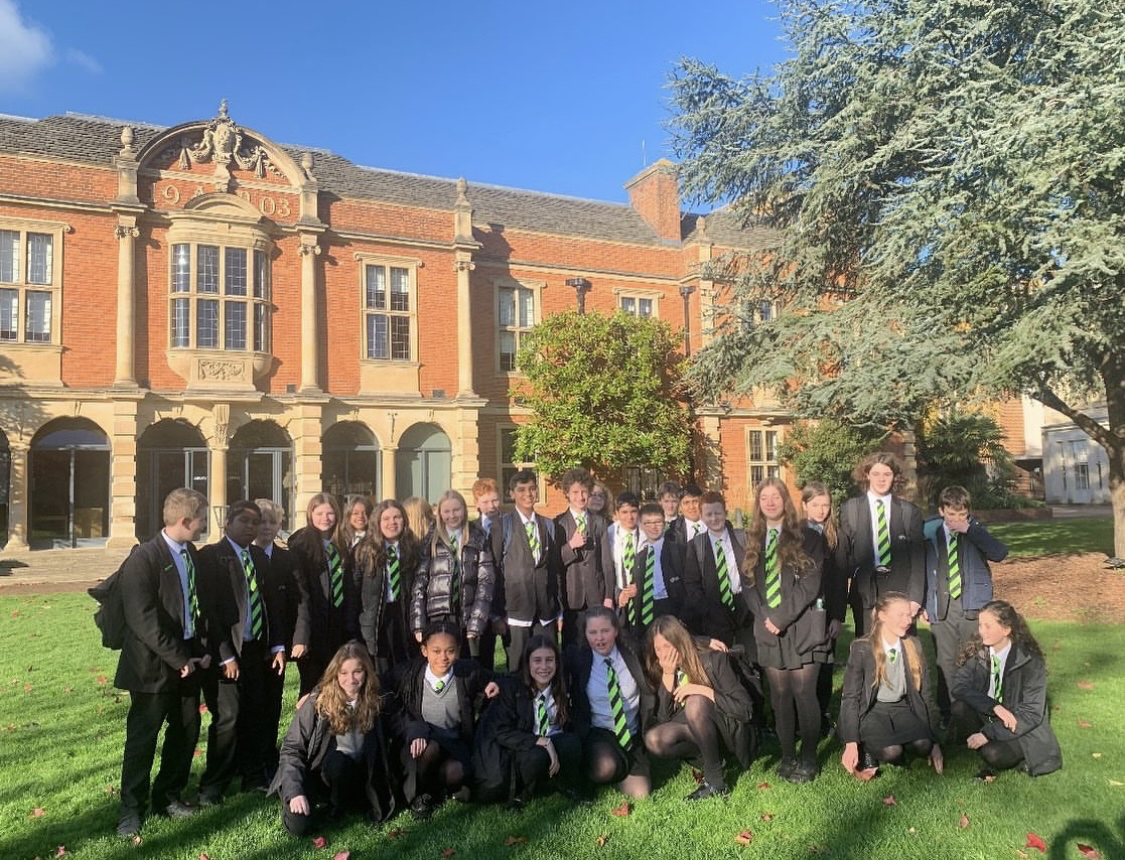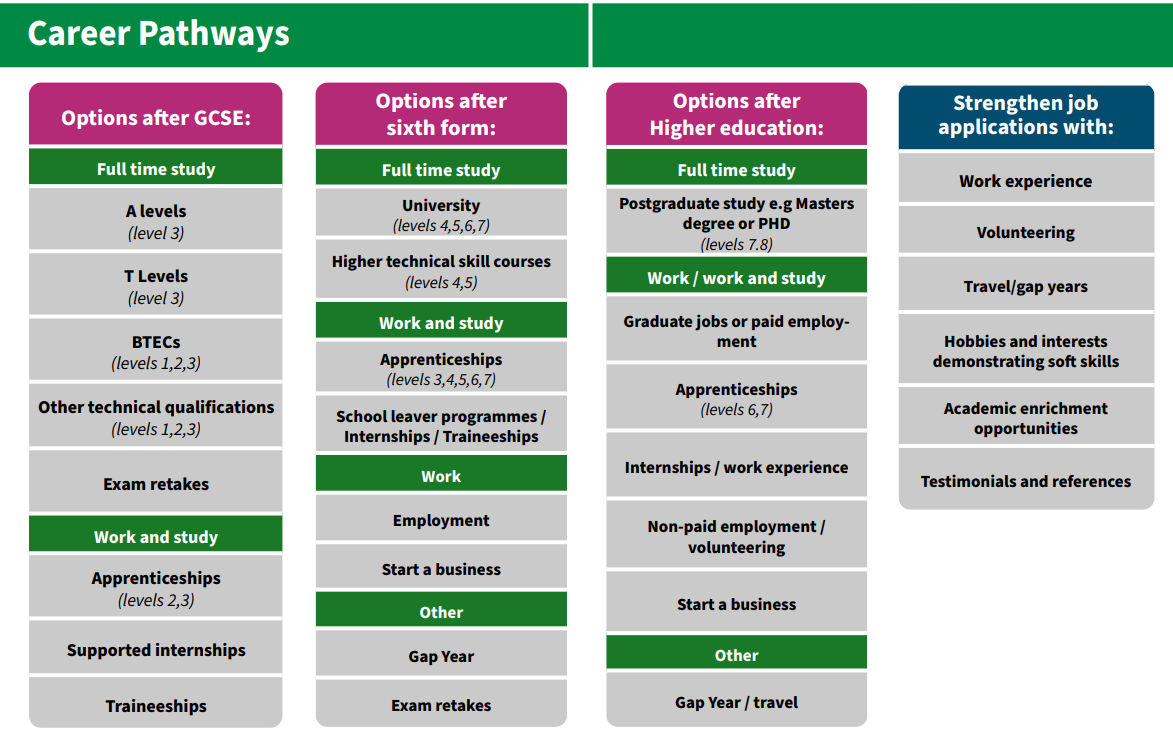Post 18 Options

Higher Education Evening 13th March 2025
We hosted a successful Higher Education Evening for Year 12 students and their parents. The event featured presentations from Alison Moore of the University of Hertfordshire and former Chiltern Hills Academy head boy Albie Salvidge, who discussed apprenticeship routes.
Thank you to all parents and students who attended.
The Introduction and Apprenticeship presentation is HERE and the UCAS presentation HERE
Alison Moore from the University of Hertfordshire began the evening by discussing various university options available to students. She provided a comprehensive overview of the UCAS process, helping attendees understand how to navigate university applications. Alison also demystified student finance, addressing common concerns about tuition fees, loans, and budgeting. Her engaging presentation left students feeling more confident about their future choices.
We were thrilled to welcome back our former Head Boy, Albie Salvidge, to Chiltern Hills Academy! Albie, who has forged a remarkable path since leaving us, spoke to Y12 about his decision to pursue an apprenticeship instead of following the traditional university route.
After completing his A-Levels, including Accounting, Albie made the bold choice to dive directly into the workforce. He secured a Level 4 apprenticeship at MHA, an independent UK member of Baker Tilly International, where he has since gained invaluable experience in audit, tax, consulting, and advisory services. Over the past four years, Albie has diligently worked his way through several professional qualifications, including the AAT and ACA, the latter being equivalent to a master’s degree.
Albie shared how this journey has enriched his business acumen and enhanced his professional skills. Now working in the Corporate Finance division, he tackles complex challenges and continues to expand his expertise. His commitment and hard work have shaped him into the determined professional he is today.
You can find the presentation HERE
Higher Education Options
Do you want to go to university? Do you want to do a Degree Apprenticeship? Do you want a gap year, take an internship or go into full-time employment?
There are many options available, and we help you make informed choices. In Year 12 you will have another 1:1 Careers Guidance interview with our Careers Advisor and take part in career-related events, all designed to help you choose your next steps.
University
A University degree can lead to a wide range of career opportunities and is often a prerequisite for many professional careers. Going to University is a great way to expand your knowledge, meet new people and enjoy new experiences. Typically, a university degree lasts for three or four years in the UK (over 50,000 courses on offer) or you could consider studying abroad.
We help you apply to University through a whole range of activities, including UCAS evening, and personal statement preparation. We offer workshops delivered by several different Universities, who come to school to guide you through the process and help prepare you.
A large percentage of our Sixth Formers go on to University. In 2024, some of the universities included University of Southampton, Leicester, Nottingham and Liverpool.

As part of our commitment to helping students apply for University, we have partnered with Unifrog, an award-winning online careers platform. Each student will have their own Unifrog account. This will enable you to explore career interests and compare every University course, every apprenticeship and further education course in the UK and internationally.
Your Unifrog account will enable you to document all your work experience, draft personal statements, upload references, compare and contrast every degree course, create a shortlist and then receive tips on how to apply.
We have also put together some useful resources for your University application in our UCAS Personals Statement Preparation and in our careers section of the website.
Apprenticeships (Higher and Degree)
Apprenticeships offer a more hands-on and practical approach to learning, enabling you to gain real-life experience while you earn and study towards a relevant qualification.
Higher Apprenticeships go from Level 4-7 and are equivalent to a foundation degree and above.
Degree Apprenticeships are available at Levels 6-7 and are equivalent to a full Bachelor's and Master’s degree.
Apprenticeships are a great option for those students who want to get ahead in a particular industry and prefer a more hands-on learning experience. They are available in 1500 occupations across 170 industries.
Degree Apprenticeships typically last between 3-6 years and offer a degree qualification, giving you a head start in the industry of your choice with no student debt, as university fees are often covered by the employer.
We often invite apprentice guest speakers to CHA and hold Apprenticeship awareness assemblies with ASK (Apprenticeship Support and Knowledge in schools and colleges) who demonstrate all the benefits of Apprenticeships. We also offer Apprenticeship Mock Interview workshops to guide your Year 12s through the interview process.
Find out everything you need to know about Apprenticeships at Unifrog Apprenticeships, Amazing Apprenticeships, our Apprenticeships section of the website and by watching this 2-minute video from Unifrog.
Degree or Apprenticeship - which one is for you?
Here are 5 important things you should think about when considering university and apprenticeships.
Not Going to University?
You can access this online guide which offers School and College leavers information on opportunities that exist outside of University such as Apprenticeships, Sponsored Degrees, Diplomas, gap years and jobs.
GAP Year: Advice and Companies
http://www.statravel.co.uk/gap-year-travel.htm
http://www.oysterworldwide.com/
Your Post 18 options at a glance
Higher Education – Level 4 and above courses undertaken at Universities, Colleges of Further Education and other Specialist Colleges.
Apprenticeships (Intermediate, Advanced, Higher and Degree Level)- Earn while you learn with 80% of your time at work and 20% of your time studying towards a nationally recognised qualification.
Employment - Paid employment usually with training specific to the job and/or company.
Internship – a period of work experience to help you decide on your career pathway.
A ‘Gap Year’- There are lots of opportunities to volunteer, travel, gain work experience.
This 2-minute video from Unifrog will help you decide which career path is right for you.
We have also put togher a summary of options together with a comprehensive Parents Guide to Next Steps which you can find below the diagram.

